

Oracle effectively says Google jumped gun with Supreme Court petition in Android-Java copyright case. James Niccolai of the IDG News Service was first to obtain a copy of Oracle's response to Google's petition for writ of certiorari (request for Supreme Court review) in the Android-Java copyright case.
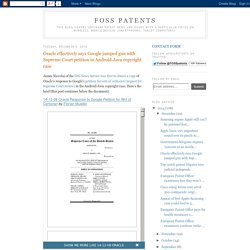
Here's the brief (this post continues below the document): 14-12-08 Oracle Response to Google Petition for Writ of Certiorari by Florian Mueller This is one of those documents that are most interesting when read backwards. WestlawNext Signon. Selecting “Remember Me on this Computer” will store sign in information (on this device; for this browser only) and will bypass the OnePass Sign In page.
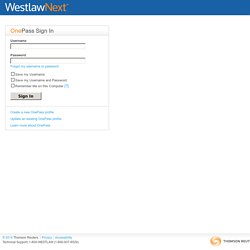
This feature may be disabled through any “Update My OnePass” link. Due to security restrictions, some users are not eligible for this feature. Sorry, there was a problem setting Remember Me on this Computer for your session. Please try again later. Sorry, an error occurred while validating if your account can use Remember Me on this Computer. Sorry, Remember Me on this Computer is not supported by your browser. Sorry, Remember Me on this Computer is not allowed due to your firm security settings. Selecting “Remember Me on this Computer” will store sign in information (on this device; for this browser only) and will bypass the OnePass Sign In page. Sorry, there was a problem setting Remember Me on this Computer for your session. Sorry, an error occurred while validating if your account can use Remember Me on this Computer.
FOSS Patents. This Week in Law 279. Guest Post: Are APIs Patent or Copyright Subject Matter? Oracle v. Google decision threatens innovation. Earlier this month the Court of Appeals for the Federal Circuit issued the latest ruling in the long-running legal battle between two Silicon Valley giants Oracle, the hardware and software maker, and Google.
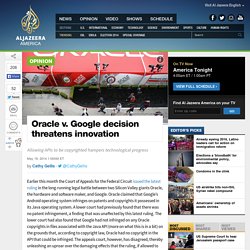
Oracle claimed that Google’s Android operating system infringes on patents and copyrights it possessed in its Java operating system. A lower court had previously found that there was no patent infringement, a finding that was unaffected by this latest ruling. The lower court had also found that Google had not infringed on any Oracle copyrights in files associated with the Java API (more on what this is in a bit) on the grounds that, according to copyright law, Oracle had no copyright in the API that could be infringed.
The appeals court, however, has disagreed, thereby unleashing an uproar over the damaging effects that the ruling, if allowed to stand, poses for future innovation. For instance, if you want to print this webpage, you will click “print” in your browser. Google tells Supreme Court no copyright protection exists for Java APIs. Landmark Oracle-Google Android Copyright Dispute May End Up In Supreme Court. Home > Copyright > Landmark Oracle-Google Android Copyright Dispute May End Up In Supreme Court While many smartphone users were gazing upon their new iPhone 6 Plus’s 5.5-inch screen with wonder, there was another notable development in the mobile/tech world – the ongoing software copyright dispute between Oracle and Google over the development of the Android mobile platform just heated up again.
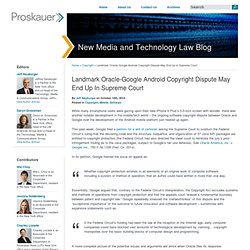
This past week, Google filed a petition for a writ of certiorari asking the Supreme Court to overturn the Federal Circuit’s ruling that the declaring code and the structure, sequence, and organization of 37 Java API packages are entitled to copyright protection (the Federal Circuit had also directed the lower court to reinstate the jury’s prior infringement finding as to the Java packages, subject to Google’s fair use defense). See Oracle America, Inc. v. Google Inc., 750 F.3d 1339 (Fed. Cir. 2014). Landmark Oracle-Google Android copyright dispute may end up in Supreme Court.
While many smartphone users were gazing upon their new iPhone 6 Plus’s 5.5-inch screen with wonder, there was another notable development in the mobile/tech world – the ongoing software copyright dispute between Oracle and Google over the development of the Android mobile platform just heated up again.
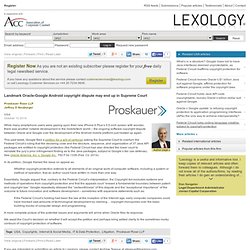
This past week, Google filed a petition for a writ of certiorari asking the Supreme Court to overturn the Federal Circuit’s ruling that the declaring code and the structure, sequence, and organization of 37 Java API packages are entitled to copyright protection (the Federal Circuit had also directed the lower court to reinstate the jury’s prior infringement finding as to the Java packages, subject to Google’s fair use defense).
See Oracle America, Inc. v. Google Inc., 750 F.3d 1339 (Fed. Cir. 2014). 14-10-06 Google petition for writ of certiorari in Oracle (c) case.pdf. After successful Oracle appeal, Google asks Supreme Court to hear Android-Java copyright case. In late July I discovered that Google had requested, and been granted, an extension of time for filing its petition for writ of certiorari (request to hear a case) with the Supreme Court of the United States.
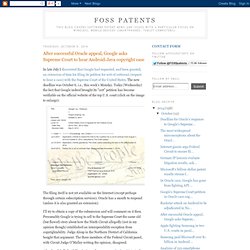
The new deadline was October 6, i.e., this week's Monday. Today (Wednesday) the fact that Google indeed brought its "cert" petition has become verifiable on the official website of the top U.S. court (click on the image to enlarge): The filing itself is not yet available on the Internet (except perhaps through certain subscription services). Oracle has a month to respond (unless it is also granted an extension). I'll try to obtain a copy of the submission and will comment on it then. After Oracle's Federal Circuit victory I wrote up a refresher Q&A. The Supreme Court can't hear every high-profile case that someone wants it to review. Google's Supreme Court petition in Oracle case suggests sudden departure from previous strategy. Yesterday it became discoverable that Google had, as expected, filed its petition for writ of certiorari (request for the Supreme Court of the United States) in Oracle's Android-Java copyright case on Monday.
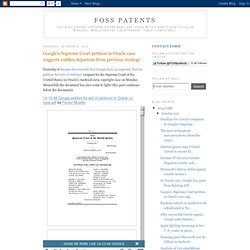
Meanwhile the document has also come to light (this post continues below the document): 14-10-06 Google petition for writ of certiorari in Oracle (c) case.pdf by Florian Mueller I'll discuss these issues in more detail when Oracle's response is known, but I did want to share a few observations. The most widespread misconceptions about the Oracle-Google Android-Java copyright dispute. After Google's recent--and expected (this blog was first to report that it was coming)--petition to the Supreme Court of the United States for writ of certiorari (i.e., for a review of the Federal Circuit's decision in Oracle's favor, see my refresher Q&A after the appellate decision), I have seen a couple of articles that described the state of affairs and quoted observers on what all of this meant.
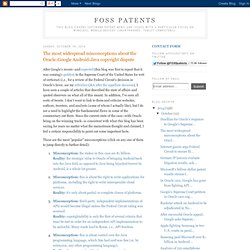
In addition, I've seen all sorts of tweets. I don't want to link to them and criticize websites, authors, tweeters, and analysts (some of whom I actually like), but I do see a need to highlight the fundamental flaws in some of the commentary out there. Since the current state of the case--with Oracle being on the winning track--is consistent with what this blog has been saying for years no matter what the mainstream thought and claimed, I feel a certain responsibility to point out some important facts. Now the more detailed explanations. More Than Java: What's Really At Stake In Google And Oracle's Copyright Case - ReadWrite. The Platform is a regular column by mobile editor Dan Rowinski.
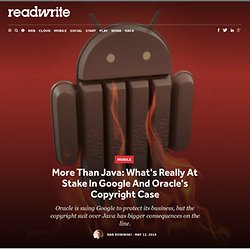
Ubiquitous computing, ambient intelligence and pervasive networks are changing the way humans interact with everything. Any artist that's ever dealt with copyright will tell you one basic fact: Copyright is the most confusing, convoluted and capricious aspect of intellectual property rights ever created. You thought patents were bad? Delve into the world of copyright and just wait for your head to explode. Google Rolls the Dice, Files Cert Petition in Oracle Copyright Case — Mass Law Blog. Google has filed a certiorari petition with the Supreme Court, asking it to review and reverse the Federal Circuit’s May 9, 2014 decision holding that the declaring code of Oracle’s Java API software is not copyrightable.
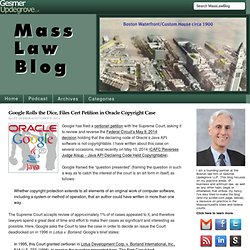
I have written about this case on several occasions, most recently on May 10, 2014 (CAFC Reverses Judge Alsup – Java API Declaring Code Held Copyrightable). Google framed the “question presented” (framing the question in such a way as to catch the interest of the court is an art form in itself) as follows: Whether copyright protection extends to all elements of an original work of computer software, including a system or method of operation, that an author could have written in more than one way. The Supreme Court accepts review of approximately 1% of of cases appealed to it, and therefore lawyers spend a great deal of time and effort to make their cases as significant and interesting as possible. In 1995, this Court granted certiorari in Lotus Development Corp. v. FOSS Patents. Google takes Java case to the Supreme Court. Google takes Java case to the Supreme CourtWashington DC | 09 October 2014 Google is pushing the US Supreme Court to take-up its long-standing battle with Oracle.
The two parties have come to blows over the use of Oracle’s application programming interface (API) for the Java programming code in Google’s open source Android operating system.